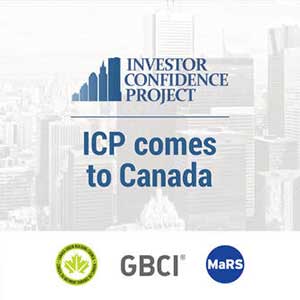Canada Green Building Council (CaGBC), Green Business Certification Inc. (GBCI) and the Advanced Energy Centre (AEC) at MaRS Discovery District are bringing the Investor Confidence Project (ICP) and its Investor Ready Energy Efficiency (IREE) certification to Canada.
 The Investor Confidence Project is a U.S.-based global underwriting standard for developing and measuring energy efficiency retrofits which is administered by GBCI. The IREE certification signals to investors a project has adopted best practices to help reduce transaction costs and increase savings. The protocols offer investors a means for assessing risk and expected outcomes from retrofits aimed at reaching targeted emissions reductions.
The Investor Confidence Project is a U.S.-based global underwriting standard for developing and measuring energy efficiency retrofits which is administered by GBCI. The IREE certification signals to investors a project has adopted best practices to help reduce transaction costs and increase savings. The protocols offer investors a means for assessing risk and expected outcomes from retrofits aimed at reaching targeted emissions reductions.
“Buildings contribute 35 per cent of Canada’s carbon emissions profile,” said CaGBC director of advocacy and development Akua Schatz. “While new buildings are getting more efficient with lower climate impact, we only replace one to two per cent of our existing building stock each year. In order to meet ambitious climate action targets to reduce emissions in our major cities — such as an 80 per cent emissions reduction by 2050 in Toronto — retrofits are essential to achieve meaningful reductions.
“Evaluating retrofit opportunities that have achieved IREE certification can help reduce transaction costs while offering more reliability in projected energy savings and returns. Notably, the ICP protocols offer a consistent, transparent roadmap to assess risk and expected outcomes when investing in upgrading an existing building’s energy performance.
“Given ICP’s status as a global certification with common standards available to underwrite energy efficient retrofit projects at scale, there is a unique opportunity to increase both the size and velocity of the market for investing back into our existing building stock.”
Financing a barrier to reducing building emissions
Canada’s existing building stock has the potential to reduce overall building emissions by up to 51 per cent by 2030, according to the CaGBC’s recent “A Roadmap for Retrofits in Canada” report. The biggest barrier for the industry and building owners is access to financing.
The IREE certification is being used by project owners, investors, engineers and insurance companies in North America and Europe. No Canadian investors are involved with ICP projects outside the country, but initial pilot projects are being lined up this summer in Ontario to test the IREE certification process in Canada.
“To date, MaRS has engaged with a diverse set of organizations that have a vested interest in accelerating energy-efficient upgrades in commercial and multi-family buildings,” said AEC senior associate Shawn Peterson.
“Types of organizations include building owners, property management firms, utilities, financial service providers, engineering consultants and public programs at all levels of government that are seeking to better incentivize energy-efficient retrofits for the existing building stock in Canada.”
The Canadian ICP pilot program is expected to accommodate approximately 10 projects varying by building type, scope of retrofit, and source of origination from a project financing perspective.
ICP protocols and benefits of certifications
There are six ICP protocols which cover the majority of commercial energy efficiency projects:
* large commercial;
* standard commercial;
* targeted commercial;
* large multi-family;
* standard multi-family;
* and targeted multi-family.
Project developers must select the appropriate protocol and then conduct all required steps for baselining energy usage and predicting savings, and include plans as specified for commissioning, operations and maintenance, and measurement and verification.
“Canada is still in the early days of developing a robust and dynamic retrofit economy ecosystem, one where key actors from the private, public and non-governmental sectors all work together and compete to make Canada’s existing building stock more sustainable and resilient in addressing climate change,” said Schatz.
“Establishing a commercially viable and accepted underwriting standard and certification for developing and measuring energy efficiency and carbon reduction in retrofits is a key component of this ecosystem.
“Implementation of Investor Confidence Project would create an industry-trusted standard, methodology and certification akin to that provided by credit rating agencies for investors in debt securities. It would also help to support the green financing products in the market.”







